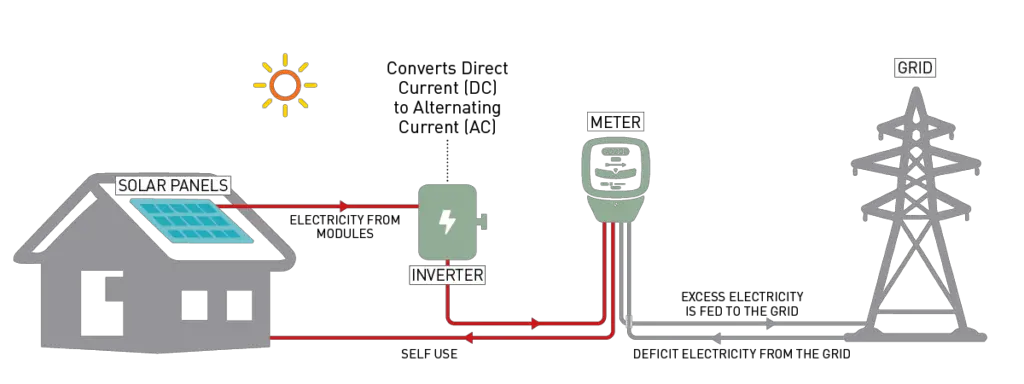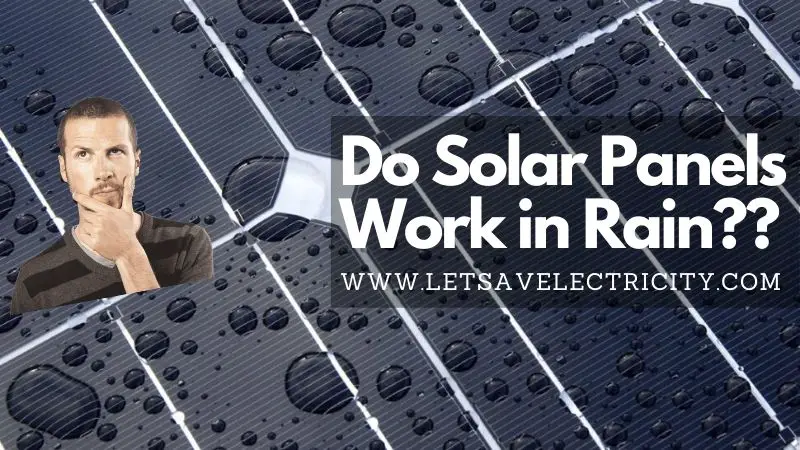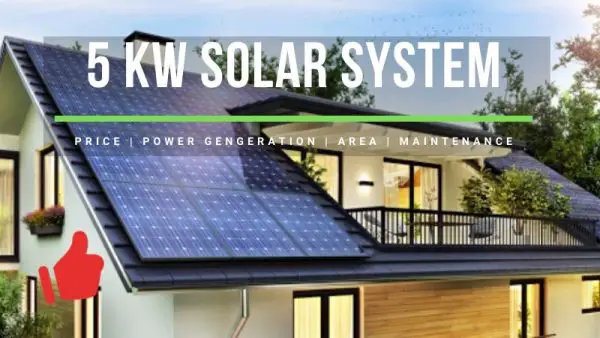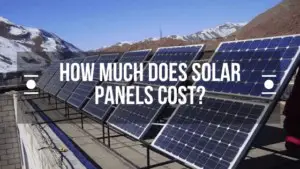Planning to go solar and wondering whether solar panels work in rainy season, well you have come the right place. In this article we will see whether solar panel work in rain and cloudy weather conditions?
Do solar panels work in rainy season? Absolutely yes. Solar panels generate 30 % – 50 % of their optimum generation during cloudy weather and 10 % – 20 % of optimum generation in heavy rain. So in summer if your 1 kW solar system was generating 4 kWh of electricity in a day then in cloudy weather the same 1 kW solar system will generate approximately 1- 2 kWh of electricity in a day.
Do solar panel work in rain and cloudy weather?
The science of generating electricity with solar panels boils down to the photovoltaic effect. It was first discovered in 1839 by Edmond Becquerel and can be generally thought of as a characteristic of certain materials (known as semiconductors) that allows them to generate an electric current when exposed to sunlight.
The photovoltaic process works through the following steps:
- The silicon photovoltaic solar cell absorbs solar radiation (photons in the sunlight).
- When the sun’s rays interact with the silicon cell, electrons begin to move, creating a flow of electric current.
Large number of solar cells are connected in series and parallel arrangement which increases the overall voltage and current.
Solar panels can use direct or indirect sunlight to generate power, though they are most effective in direct sunlight. Solar panels still work even when the light is reflected or partially blocked by clouds.
There will always be visible light even during the harshest storms and it will penetrate through clouds and rain.
To give you an average figure on solar panels generation during monsoon,
- In cloudy days solar panels normally generate 30 % – 50 % of their optimum generation and
- In heavy rain solar panels generate 10 % – 20 % of their optimum generation.
Hence be rest assured there will be at least some power production even in stormy rain.
So if in summer your 1 kW solar system was generating 4 kWh of electricity in a day then in cloudy weather the same 1 kW solar system will generate approximately 1- 2 kWh of electricity in a day, whereas in heavy rain it may generate 0.5 – 1 kWh of electricity.
In the table below you will find daily solar panels generation in normal days Vs cloudy days Vs heavy rainy days. The below figure are for Mumbai, India here we recieve around 300 sunny days in a year, if you live in a region where there are less sunny days then the generation figures will change.
| Solar System | Daily Solar Generation in Sunny Weather | Daily Solar Generation in Cloudy Weather (50%) | Daily Solar Generation in Rainy Weather (10%) |
|---|---|---|---|
| 1 kW | 4 kWh | 2 kWh | 0.5 kWh – 1.5 kWh |
| 3 kW | 12 kWh | 6 kWh | 1 kWh – 3 kWh |
| 5 kW | 20 kWh | 10 kWh | 2 kWh – 4 kWh |
| 8 kW | 32 kWh | 15 kWh | 3 kWh – 6 kWh |
| 10 kW | 38 kWh | 18 kWh | 4 kWh – 8 kWh |
This is just to give you a rough idea on what kind of generation you can expect from your solar panels during rainy season.
How will I power my house in rainy season from solar panels?
Most people who install solar on their houses have an on grid solar system / grid tied solar system. In an on grid solar system you have two sources of electricity one is your solar and other is your electricity provider.

During rainy season when your solar is not performing at its peak you will pull the extra energy your house needs from the utility grid and the electricity provider will charge you for those units at the end of the month.
So whatever electricity deficit you have from your solar panels your appliances will pull from the utility grid.
Most on grid solar system are designed keeping in mind rainy season, during summer when sun is at its peak, your solar will generate more power (more than what is needed) and supply the excess power to the utility grid.
The utility company will credit those surplus units of electricity in your electricity bill which you can use during rainy season, hence if sized properly you won’t get much electricity bill even in rainy season.
What about battery based solar system?
If you have a solar off grid system installed at your place then there are chances that if it rains heavily for couple of days you might lose power as your batteries will get discharged if it’s not designed to provide 2 days backup.
To avoid blackout during rainy season in a solar off grid system you can do either of the two things.
- Get a small diesel generator which you can use for worst case scenarios like when you batteries are completely drained.
- Add extra batteries to increase your electricity storage for such worst case scenarios.
Do solar panel work at night?
No, solar panels don’t work in night. Once sun is set your solar system shuts down automatically.
- At night, if you have a solar on grid system you will pull the needed electricity from the utility grid.
- And if you have a solar off grid system you will pull the needed electricity from the batteries.
In both cases you will have enough electricity to power your house even though solar panels won’t generate any electricity at night.
How to get more power from solar panels during rain:
If you have already installed solar panels then I am afraid there are no ways to increase it’s generation all you can do is add couple of solar panels to the system to oversize it. However if you are planning to install one then keep the following things in mind to get optimum generation in rain.
- Do not install in shadow prone region: Ask your installer to do a shadow analysis to find out which place of your roof will receive shadow and which place won’t. If you have a overhead water tank, trees surrounding your house or a tall building nearby then chances are they will cast shadow. Identify the place which receives least shadow and install solar panels over there.
- Go with monocrystalline: If you live in a place which has heavy monsoon then invest in monocrystalline solar panels they offer slightly better performance in low light conditions than polycrystalline.
- Oversize your system: If you are planning for an off grid system, then oversize your system this way you will have more electricity stored in your batteries.
Latest tech – Solar cell captures energy from rain drops:
The new device, demonstrated in a laboratory at Soochow University in China, places two transparent polymer layers on top of a solar photovoltaic (PV) cell. When raindrops fall on to the layers and then roll off, the friction generates a static electricity charge.
“Our device can always generate electricity in any daytime weather,” said Baoquan Sun (Inventor), at Soochow University. “In addition, this device even provides electricity at night if there is rain.”
The idea is interesting – a hybrid device that harvests kinetic energy from water without destroying the output of the solar cell during sunny times.
However, the power this device generates from falling rain drops needs to be significantly higher to start making an overall difference to a solar panel’s output. As of now I don’t know whether this technology generated significant amount of electricity.
The scientist have published there research in ACS magazine which you can access from here – https://pubs.acs.org/doi/full/10.1021/acsnano.8b00416
You can read more on this latest technology in solar panels over here – https://www.theguardian.com/environment/2018/mar/13/rain-or-shine-new-solar-cell-captures-energy-from-raindrops.
Conclusion on do solar panels work in rain:
To conclude this article, yes solar panel generate electricity during rain. It will not be as much as sunny days but there will be generation.
Below is the average figure of solar panels generation in monsoon,
- During cloudy days solar panels normally generate 30 % – 50 % of their optimum generation and
- During heavy rain solar panels generate 10 % – 20 % of their optimum generation.
If you like this article the please share it on WhatsApp, facebook, reddit and anywhere and everywhere else.
Thank You 🙂
References for do solar panels work in rain:
- https://www.euroscientist.com/scientists-design-new-solar-cells-to-capture-energy-from-rain/
- https://www.azocleantech.com/article.aspx?ArticleID=725
- https://pubs.acs.org/doi/full/10.1021/acsnano.8b00416
- https://www.seia.org/initiatives/what-happens-solar-panels-when-its-cloudy-or-raining





